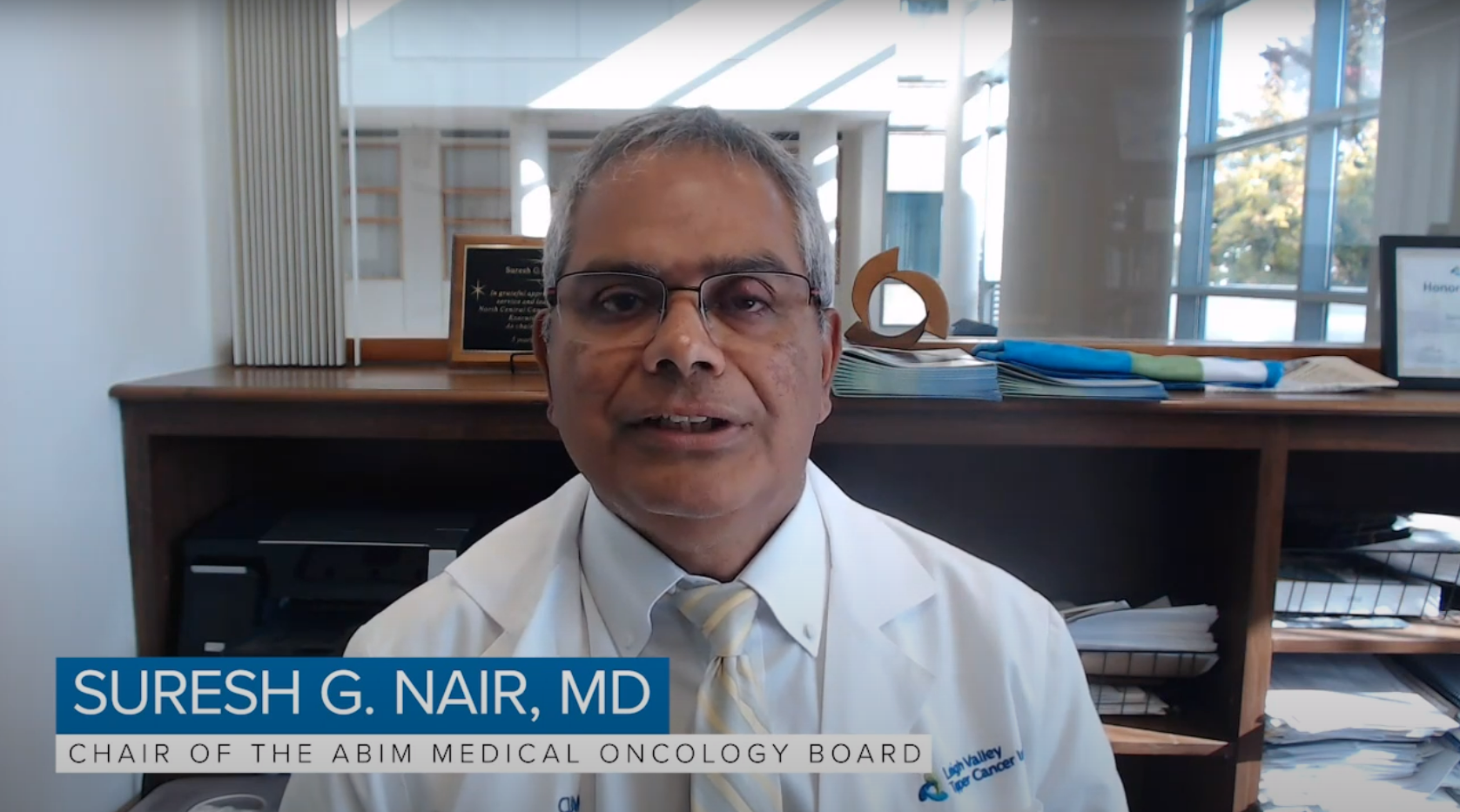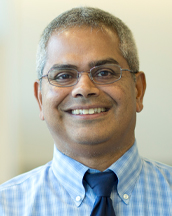
The Medical Oncology Board held its fall meeting on Monday, October 16, 2023. The agenda provided an opportunity to update the Specialty Board on activity at ABIM and allowed for discussion of pressing issues in the field. The Specialty Board was joined for a portion of the meeting* by guests from the American Society of Clinical Oncology (ASCO).
The following is a summary of the fall meeting.
Conversation with the President*
Prior to the meeting, members and guests of the Medical Oncology Board had the opportunity to review a video update from Richard J. Baron, MD, MACP, President and Chief Executive Officer of ABIM and ABIM Foundation, reflecting on current issues for ABIM and the internal medicine community. Dr. Baron invited the specialty board to discuss these topics, including:
- Recent public conversations and press coverage around the value of ABIM’s Maintenance of Certification (MOC) program.
- Engagement of early career physicians and trainees in ABIM’s work and how members of ABIM governance can facilitate conversations with colleagues and leaders in their disciplines to foster better understanding of ABIM’s mission and programs.
- The ongoing and evolving challenges in addressing misinformation, and the historical roots of mistrust in science and medicine, as explored at the ABIM Foundation Forum in July.
Specialty Board members shared their perspectives on the MOC program and discussions heard in their own communities, such as the idea that continuing medical education alone is enough to stay current in medical knowledge, or physicians who find value in MOC but see room for improvement. The group also discussed the question of how to balance specialization with the broad “walking around” knowledge that assessments test, particularly in the field of oncology, which changes so rapidly and whose diplomates often maintain more than one certificate. Dr. Baron emphasized ABIM’s commitment to better communicate the central value of the organization’s mission, which is centered on patient care. This can include the development of practice profiles within some disciplines where the physician data supports a significant number of physicians focusing their practice in particular areas of the specialty. But this work takes time and must be evidence-based. He added that ABIM remains committed to making MOC valuable for all diplomates and is continuing to listen to diplomate feedback and perspectives on ABIM’s MOC program.
Diversity, Equity and Inclusion (DEI)*
The Specialty Board received an update on ABIM’s DEI work from Lorna Lynn, MD, Vice President of Medical Education Research; Kelly Rand, MA, CPH, Program Officer of Diversity and Health Equity; and Pamela Browner White, Senior Vice President of Communications and Chief DEI Officer.
Their central points included:
- A September meeting in collaboration with 24 medical specialty societies around DEI and how ABIM can collaborate with and support societies in this work. This meeting highlighted work that societies and ABIM can do together in the areas of shared resources, developing pathway programs to diversity the health care workforce and providing support for mentorship programs.
- Collaboration with the Accreditation Council for Continuing Medical Education (ACCME) to explore the possibilities of offering continuing medical education credit and MOC points for mentoring activities based on feedback that identified the importance of mentorship for students, trainees and underrepresented groups who face barriers to success because of personal characteristics.
- Fairness review pilots conducted in cardiovascular disease, gastroenterology, internal medicine and nephrology over the past year using statistical analysis and content review to identify bias in ABIM assessment questions (items) in those disciplines.
The presenters invited Specialty Board members to share experiences from their own communities regarding DEI work and health equity. Olatoyosi Odenike, MD, emphasized the importance of mentoring students to pursue medicine and how having more mentors who come from an underrepresented background can encourage trainees to pursue a similar path in medicine. Suresh G. Nair, MD, Chair of the Medical Oncology Board, added that systemic disadvantages also play a role in adding to the challenges of getting into medical school, which is already a competitive process. Many students face an additional barrier because they do not have access to mentorship in their own communities, though some programs exist to help address this circumstance. Ann S. LaCasce, MD, pointed out that there might be an opportunity in the future to connect physicians close to the end of their careers with younger generations to offer career advice/mentoring and technical skills.
Listening Session on the Longitudinal Knowledge Assessment (LKA®)*
Prior to the meeting, Specialty Board members and guests had the opportunity to review a video update sharing recent insights about diplomates’ engagement in the LKA and their experience and feedback. Some key points included:
- The relatively small number of diplomates unenrolling from the LKA may be physicians who find they prefer the Traditional, 10-year MOC exam, or who find that the commitment to 30 questions per quarter does not align with their availability.
- Diplomates certified before 1990 can use the LKA to meet their assessment requirement to remain publicly reported as “Participating in MOC.”
- Physicians continue to choose the LKA over the Traditional, 10-year MOC exam at a rate of 4:1 on average across all 15 subspecialties in which it is offered.
- On average, LKA participants are taking less than two minutes to answer each question, equating to less than one hour per quarter in total. ABIM also offers accommodations in compliance with Title III of the Americans with Disabilities Act, which can include time added to the standard four minutes that physicians have to answer each question as well as the 30-minute time bank, if approved.
Benjamin Chesluk, Ph.D., Senior Researcher, Ethnographic Research at ABIM, invited the group to offer perspectives from their own communities and discuss what information they would find useful for the future. Members of the Specialty Board asked for more information about how ABIM keeps assessment items current and whether the traditional, 10-year MOC exam will remain an option for assessment. Rebecca S. Lipner, Ph.D., Senior Vice President of Assessment and Research at ABIM, explained the item review process which includes rigorous review by the Approval Committees in each discipline in which the LKA is offered, and noted that diplomates can flag items on the LKA for review. These items are put through the key validation process as an important part of ensuring that items remain current. To date, approximately 20% of physicians eligible for assessment choose the traditional, 10-year MOC exam, and ABIM plans to continue offering it as an assessment option.
Diplomates with an assessment due in 2024 can enroll in the LKA or register for the traditional, 10-year MOC exam as of December 1, 2023. Diplomates are encouraged to check their Physician Portal for upcoming requirements and eligibility.
Annual Maintenance of Certification Status Review*
Florence Mickens, Program Operations Manager at ABIM, and Weifeng Weng, Ph.D., Director of Research and Data Intelligence, reviewed the annual process through which ABIM evaluates certificates to determine whether an individual diplomate is meeting MOC requirements. The requirements are to be current with the MOC assessment requirement, attestations and MOC points (some points every two years and 100 points every five years). Certificates that do not meet these requirements will either experience a status change in certification or participation or enter a grace period. The way diplomates’ activities for MOC points are reported to ABIM varies based on the activity itself and the provider. Most are generated by provider reports to ACCME and in turn ABIM. A few require staff to complete the process. Diplomates are encouraged to check their Physician Portal regularly to ensure that their MOC points are being reported accurately.
Dr. Weng explained that the 2023 cohort of “at-risk” certificates is comparatively large due to two primary contributing factors:
- The number of physicians who earned initial certification prior to 2014 when the current MOC program requirements began are now due for their second five-year MOC point requirement. Physicians who earned certification in 2018 are also due for their first five-year point requirement in 2023.
- The extension given to certificates in Critical Care Medicine, Infectious Disease and Pulmonary Disease as a result of the pandemic has ended.
ABIM engages in a robust and comprehensive communications strategy over several months to alert at-risk diplomates of upcoming deadlines in order to minimize the number of diplomates who miss the deadline and are subsequently reported as “Not Certified.” Tactics include email campaigns, postcards and e-newsletters.
Some members of the Specialty Board asked clarifying questions about how to earn MOC points and the probability of diplomates completing their points requirement by the end of the year. Furman S. McDonald, MD, MPH, Senior Vice President for Academic and Medical Affairs, noted that there are many ways to earn points (see link above) and in some cases, diplomates record points they earned throughout the year in the last quarter. The Physician Portal app offers a way for diplomates to review their status and requirements quickly and clearly. He added that even if a diplomate’s status changes after the end of the year, it is automatically restored once the requirement is met.
Society guests departed at this point in the meeting.
Opportunities for Engaging Early Career Physicians
ABIM is one of several organizations that nominate candidates for the Accreditation Council for Graduate Medical Education (ACGME) Residency Review Committee for Internal Medicine (RC-IM). The RC-IM invited ABIM to nominate two physicians for the committee who will still be in training during their two-year term. Nominations were solicited from ACGME-accredited internal medicine residency and fellowship program directors.
The Specialty Board was asked to interview candidates who applied for a position at a hematology/oncology training program. After discussion, they agreed on and voted for one candidate to nominate for the trainee position on the RC-IM. The candidate chosen by the Medical Oncology Board will go forward for consideration by the ABIM Council along with candidates put forward by other ABIM Specialty Boards, from which two will be sent to the RC-IM for a final selection.
Sarah Joy Wartinger, Program Manager for Medical Specialties at ABIM, also shared ABIM’s plans to explore a convening of early career physicians (those within the first ten years of initial certification) across the disciplines of internal medicine. The convening would offer an opportunity to learn more from young physicians by gathering trainees and/or newly certified diplomates, including prospective nominees not chosen to serve on the RC-IM.
Recommending Specialty Board Candidates to ABIM Council
With one seat on the Medical Oncology Board becoming vacant in July 2024, the group held a discussion about the physician candidates that applied during the application period in the summer of 2023. As part of the process, the Specialty Board selects two candidates and recommends them to the ABIM Council for a final decision. Among other things, the group considered the present and projected composition of the Specialty Board and how to center DEI in their decision about who to recommend.
After some deliberation, the Medical Oncology Board voted for two candidates to recommend to Council. Once approved by the Council, the new member’s term will begin July 1, 2024.
Update on the Medical Oncology Approval Committees
Nina Karlin, MD, Mayo Clinic Arizona; Chair of the Medical Oncology LKA Approval Committee
Pamela N. Munster, MD, University of California, San Francisco; Chair of the Medical Oncology Traditional, 10-Year MOC Exam Approval Committee
ABIM Approval Committees are responsible for approving and editing all assessment content, and maintaining the blueprints for the initial certification examination, the MOC exam and the LKA. There are two ABIM approval committees related to medical oncology: the Traditional, 10-Year MOC Exam Approval Committee (which also deals with the initial certification exam) and the LKA Approval Committee. Dr. Karlin and Dr. Munster provided a brief update for the Medical Oncology Board on the composition of the Approval Committees, progress on item development in meetings this year and news about the Item-Writing Task Force. Dr. Munster added that they have invited members of the Item-Writing Task Force to Approval Committee meetings to learn more about the approval process and foster the item-writing process.
Communications and Governance Engagement
John Held, Senior Director of Communications and Brand Management for ABIM, provided an update on ABIM’s communications work and current trends in the community. He invited the Specialty Board members to share their own perspectives and discuss how ABIM can foster better understanding and enhance the perceived value of the MOC program among diplomates.
Dr. Nair noted the importance of including the patient perspective in communications about the value of certification; patients are not fully aware of what MOC involves and why it matters for them, and ultimately are the reason that physicians want to stay current with medical knowledge. ABIM is committed to continuing to listen to and engage with diplomates in order to evolve programs and products that better serve their interests and practices.
In Closing
The Medical Oncology Board values the feedback and commentary of the entire medical community, including diplomates and society partners.
Do you have any questions? Are you interested in getting involved?
If you have questions after reading this report, please connect with us through the following channels:
- Subscribe to the ABIM blog.
- Call 1-800-441-ABIM (2246).
- Email request@abim.org.
- Join our Governance to help guide our future direction.
- Join our Community Insights Network to share your feedback.
*Indicates that Society guests were present for this session.




